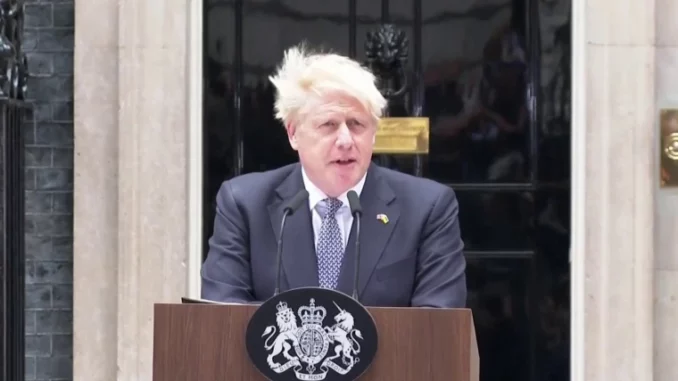
The race to succeed Johnson has already started
I.S. Saluja
LONDON (TIP): Boris Johnson would have completed 3 years as Prime Minister of UK on July 24. But that was not to be. A man who rode to power with an 80-seat majority three years ago as charismatic leader fell from grace as a host of his Ministers, including those who were appointed days earlier, publicly called for his resignation on Wednesday, July 6. Johnson, a journalist-turned-politician who rose to the pinnacles of power riding the Brexit wave, tried to cling on to his position till the last minute. But despite Downing Street’s fightback, the intra-party rebellion spread like wildfire, engulfing even the loyalist inner circle. Faced with no other choice, he agreed on Thursday, July 7, to stand down as the Conservative Party leader immediately and resign as Prime Minister in October when the party chooses a new leader. The race to replace Boris Johnson has already begun, after the prime minister quit as Tory leader following a dramatic few days that saw his authority collapse, reports BBC.Tom Tugendhat is the latest MP to throw his hat into the ring, joining Attorney General Suella Braverman and Brexiteer Steve Baker who have shown interest. Nearly 60 Conservative MPs have quit government roles in recent days at both senior and junior levels, raising doubts about the government’s ability to function. Speaking to his newly appointed cabinet on Thursday, Johnson promised he would not use his remaining time in No 10 to make “major changes of direction”.
A timetable for the Tory leadership race is due to be confirmed next week and the new prime minister is expected to be in position by September. But unofficially, the contest is already under way. The chair of the foreign affairs committee Tugendhat launched his leadership bid by writing in the Daily Telegraph on Friday, July 8, promising tax cuts and “new energy and ideas” for government. “I have served before – in the military, and now in Parliament. Now I hope to answer the call once again as prime minister,” said the former soldier, who has been a prominent critic ofJohnson.
Attorney General Ms Braverman has already confirmed she will stand, while former Brexit minister Baker said he was “seriously” considering running after being asked by people to do so.
Sajid Javid, the former health secretary, and Transport Secretary Grant Shapps – who both revolted against Johnson – are also considering putting their hats into the ring, the BBC has been told. Others tipped to run include Foreign Secretary Liz Truss, former Chancellor Rishi Sunak and ex-Foreign Secretary Jeremy Hunt. More declarations are expected in the coming days – but some senior Tories have already said they will not be running, including former Levelling Up Secretary Michael Gove, Deputy Prime Minister Dominic Raab and former Health Secretary Matt Hancock. Former Chancellor Rishi Sunak and Transport Secretary Grant Shapps are among those tipped to run in the leadership campaign. Brexit minister Jacob Rees-Mogg criticizedSunak on Thursday, saying he was “not a successful chancellor” and “not alert to the inflationary problem”. Speaking on Channel 4 News, the Johnson loyalist said the PM had been an “exceptionally good leader” who had been brought down by some “relatively minor missteps that got taken out of all proportion”.
Transport minister Robert Courts said Shapps, who he works alongside, would be a “great choice” and also suggested Ben Wallace, the defense secretary. “I think we need someone who’s got experience, someone who is able to campaign… someone who’s able to deliver,” he told BBC Newsnight. The wannabes will fight a popularity contest among Tory MPs in the next few weeks, and should two of them be left at the end of that process, Conservative Party members will get the final say over the summer.
Somewhere between 100,000 and 200,000 people will be charged with selecting the next head of our government on our behalf. It is a safe bet the next prime minister will be a very different character to Boris Johnson. Given the manner and motivations behind his toppling, being seen to ooze integrity and revere truth are qualities all the candidates will aspire to illustrate. But beyond that there will be an intriguing debate about what it means to a Conservative in 2022. When a new leader assumes office, the political landscape will instantly shift. Meanwhile, Conservative backbench MP and former cabinet minister Andrew Mitchell said: “We need a complete break from the Boris years.” Asked about what he would want in a new leader, he said someone with domestic and international experience and “someone who is patently moral and decent”. MP John Baron said he thought a new leader should focus on the cost of living crisis, levelling up and helping the most vulnerable in society. It is important that “integrity” is at the heart of the government, he told the BBC.
Any candidate for the leadership race would need to secure the backing of Tory MPs, with the final two candidates then going to a ballot of Conservative members. Some Tories are deeply unhappy that Johnson is not quitting as PM immediately, with the former Prime Minister Sir John Major saying it would be “unwise” for him to stay until a replacement is chosen.
Conservative MP Justine Greening said it was time for Johnson to go and while he remains in No 10 “it’s harder for the party and the country to move on”. But Lord Vaizey who formerly served as a minister for David Cameron, said it was “fine” for the PM to continue “to act as caretaker”. Getting rid of a prime minister can lead to “dissatisfaction” with party members and voters who elected them, he told Newsnight. The Labour Party has also threatened to try and unseat the PM immediately through a vote of no confidence, although this would need considerable support among Conservatives to succeed.
According to Downing Street, Johnson told ministers at a cabinet meeting on Thursday that he would not seek to implement “major changes of direction” or take “major fiscal decisions” while a caretaker PM. In his resignation speech outside No 10 on Thursday, Johnson said he had tried to stay on to deliver on his “incredible mandate” from the 2019 election. He cited various achievements including Brexit and the Covid vaccine programme. He said his departure was a result of the “herd instinct” at Westminster and it would be “painful” to not deliver on “so many ideas and projects”. Johnson also spoke to President Zelensky of Ukraine, reassuring him that his replacement would remain as committed to the war-torn country as he was.





Be the first to comment